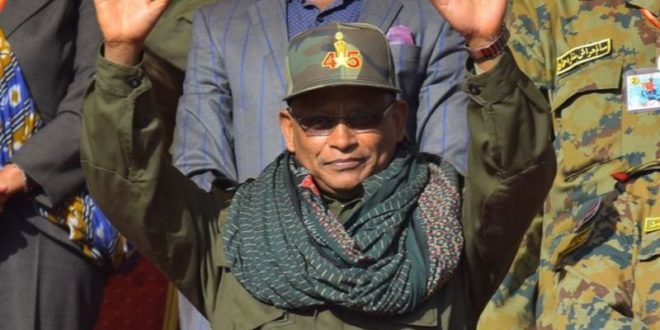A former guerrilla fighter who used to jam the communication network of Ethiopian troops, Debretsion Gebremichael is now leading the fight against Prime Minister Abiy Ahmed’s government for control of the northern Tigray region, described as the “womb” of the nation.
Mr Debretsion leads the Tigray People’s Liberation Front (TPLF), the party which controls Tigray, and which has fallen out so dramatically with Mr Abiy.
Now married with a young child, Mr Debretsion cut short his studies at the University of Addis Ababa in the 1970s to join the TPLF in its 17-year war against Marxist ruler Mengistu Haile Mariam’s Derg regime.
He then went on to be a government minister after the Derg had been defeated and replaced by a coalition of parties dominated by the TPLF until Mr Abiy came to power in 2018.
His close friend and comrade Alemayehu Gezahegn said that after they had both completed their military training in the rugged and mountainous terrain of Tigray and, noting his comrade’s technical skills, he suggested to TPLF commanders that Mr Debretsion should be deployed to the “technical unit”.
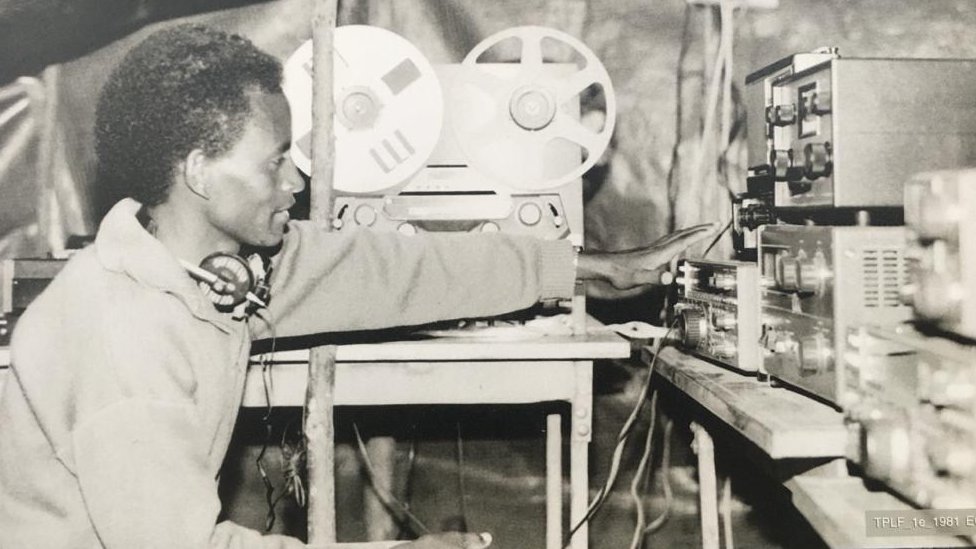 IMAGE COPYRIGHTTPLF MUSEUM
IMAGE COPYRIGHTTPLF MUSEUMFor Mr Alemayehu, this was the logical place for Mr Debretsion, as he was a bright, but reserved, “city boy” who grew up in Shire, which, in a major blow to the Tigray leader, is now under the control of federal troops.
‘Made lightbulb from scraps’
Coming from an Orthodox Christian family, the Tigray leader was named Debretsion, which means Mount Zion, while his second name is that of his father, Gebremichael, meaning Servant of Saint Michael.
“When he was in primary school, he used to collect old batteries, radios, electric equipment, and fix them. When no-one had electric power in our town, he made a lightbulb for himself from scraps,” Mr Alemayehu recalled.
Mr Debretsion excelled in the TPLF’s “technical unit”, playing a vital role in developing intelligence capabilities so that the TPLF could eavesdrop on the conversations of the Ethiopian army and jam their radio communications.
“This helped us to win because TPLF freedom fighters knew about enemy movements in advance, and, being jammed, they could not communicate with each other when they were attacked,” Mr Alemayehu said.
To further develop his skills, Mr Debretsion travelled to Italy on a false passport and returned to set up the TPLF’s first radio station – Dimtsi Weyane, meaning Voice of the Revolution.
‘Nearly slipped to his death’
Another TPLF guerrilla fighter, Measho Gebrekidan, recalled that they used to go to the mountains at night, when the chances of being spotted by government spies were slim, to install antennas.
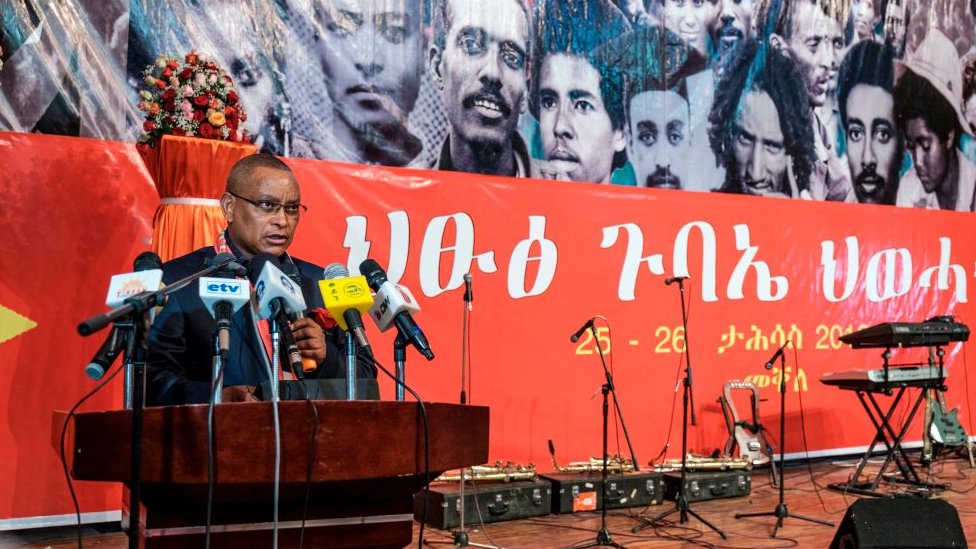 IMAGE COPYRIGHTGETTY IMAGES
IMAGE COPYRIGHTGETTY IMAGES“One night, he slipped… and it was me and another comrade who saved his life. I always thought that if this had happened, would this radio have been created?” Mr Measho said.
Now Dimtsi Weyane is part of a multilingual and multiplatform media group based in Tigray’s capital, Mekelle, broadcasting TPLF statements about its military confrontation with the federal government.
The media station has broadcast fierce criticism of Mr Abiy, and as the conflict began its signal was jammed, but Dimtsi Weyane was back on air the next day.
Abiy’s rival for prime minister
Mr Debretsion and Mr Abiy seemed to be friends at the start of the prime minister’s time in office in 2018. The Tigray leader even arranged a rapturous welcome for the prime minister in Mekelle.
“Tigray is a place where the history of our country is cooked, and it’s the region where foreign invaders [including Italians and Egyptians] had been defeated and embarrassed. In modern Ethiopia, it is the womb of Ethiopia,” Mr Abiy said in 2018.
I told him Mr Abiy: ‘You are immature. You are not the right candidate'”

For his part, Mr Debretsion hailed the prime minister’s peace initiative with Eritrea’s President Isaias Afwerki to end the “no war-no peace” situation that had existed between the two countries since the end of their 1998-2000 border conflict.
“[Mr Abiy] travelled to Eritrea and met Isaias. This was impossible for many years. It’s a big deal because it is going to give a massive opportunity for the country,” Mr Debretsion said when the deal was agreed.
But this display of comradeship appears to have masked the tensions that were brewing between the two men.
Mr Debretsion had ambitions to be prime minister himself and lost out to Mr Abiy in the 2018 contest within the ruling coalition.
“I told him: ‘You are immature. You are not the right candidate’,” Mr Debretsion told the UK-based Financial Times newspaper in 2019.
But his defeat did not come as a surprise, as the TPLF had become synonymous with repression and corruption during its 27 years as the dominant country’s dominant political force.
Views about Mr Debretsion’s performance when he was working in government are mixed.
Telecoms monopoly
His critics say that when he was the deputy head of the intelligence bureau in the 1990s, he was instrumental in spying on opposition figures, and helping to crush dissent.
But his supporters focus on the fact that he transformed Ethiopia’s telecommunications infrastructure when elevated to the cabinet, where he served as deputy prime minister and as minister of communications and information technology.
He launched massive projects to expand mobile phone coverage across Ethiopia, though the state kept a monopoly over the industry, and the telecom company has been criticised for internet shutdowns aimed at curbing anti-government protests.
“Most of the power and telecom infrastructure projects were led by him,” US-based public policy expert Dade Desta said.
“The IT Park that is now in Addis Ababa was his idea [and] his fingerprints can be found in many state-owned projects.”
This includes the building of the Grand Ethiopian Renaissance Dam, which is now at the centre of diplomatic tensions with US President Donald Trump warning that Egypt might “blow it up”.
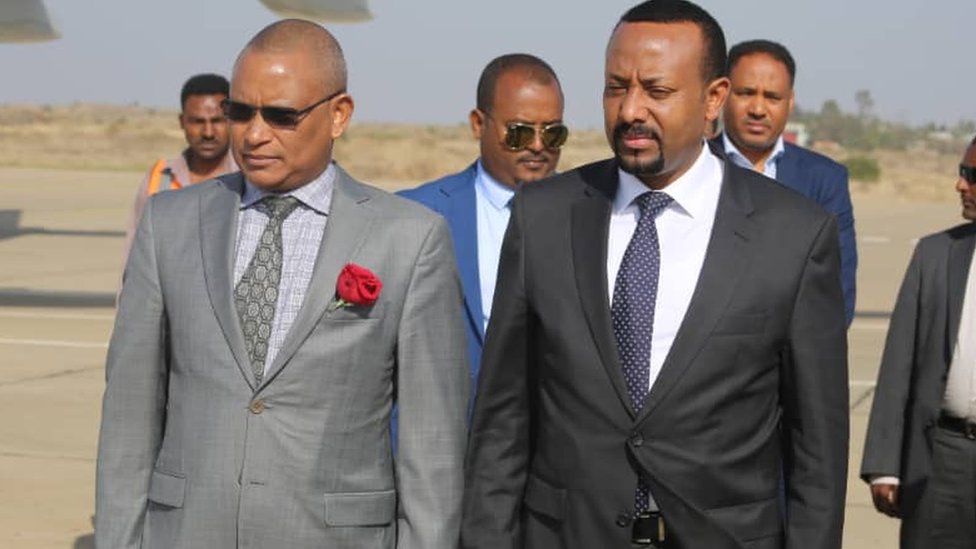 IMAGE COPYRIGHTTIGRAY PRESIDENT’S OFFICE
IMAGE COPYRIGHTTIGRAY PRESIDENT’S OFFICEThe TPLF and the prime minister parted ways when Mr Abiy dissolved the Ethiopian People’s Revolutionary Democratic Front, the ruling coalition of ethnically based parties, to launch the Prosperity Party in 2019, arguing this would help unite the country.
The TPLF refused to join, arguing that Ethiopia’s federal nature was a better way to manage the country’s deep ethnic divides.
Mr Debretsion returned to Tigray where he was seen as a reformist. He allowed four new political parties to contest the regional election held in September in defiance of the federal government.
“My door is open to everyone,” he often said.
“We want development; not war,” was another common statement of Mr Debretsion.
‘This war is a curse’
But now, he finds himself at the centre of a conflict that is reported to have killed hundreds of people, forced more than 30,000 people to flee to neighbouring Sudan, and damaged crucial infrastructure – including roads and buildings – in a region with the highest levels of poverty in Ethiopia, according to the UN.
“Mr Debretsion counts this war as a curse,” Mr Dade said.
But, he added, he expected the TPLF to strongly resist attempts by Mr Abiy to establish a new administration in Tigray.
“They [the TPLF] were in the war with Eritrea, and the struggle against the Derg. So they have enough experience. By its nature, war needs the will of the people to fight, which there is in Tigray,” Mr Dade said, raising the prospect of a long conflict.
However, Mr Abiy is also confident that he can defeat the TPLF and bring Mr Debretsion, who is facing charges of treason and rebelling against the constitution, to justice.

Five things about Tigray:
1. The Kingdom of Aksum was centred in the region. Described as one of the greatest civilisations of the ancient world, it was once the most powerful state between the Roman and Persian empires.
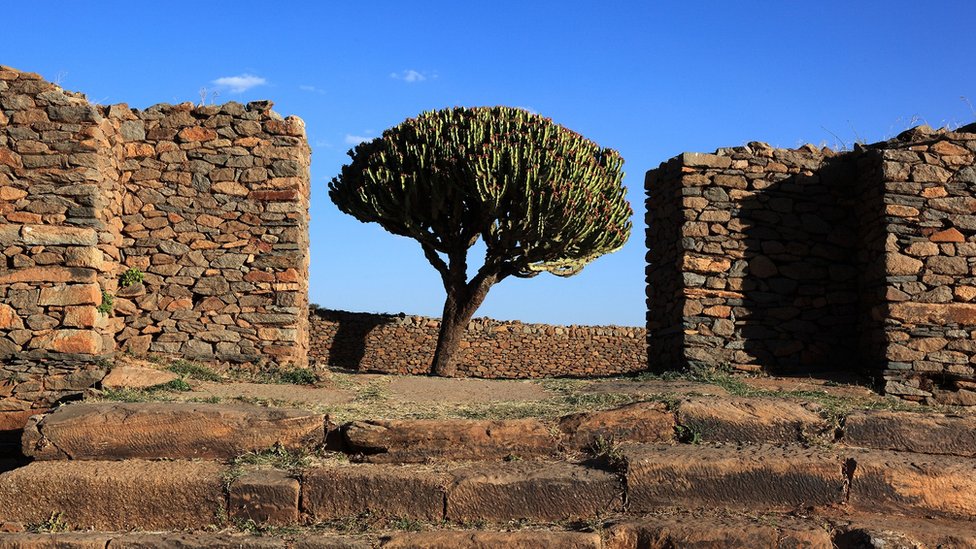 IMAGE COPYRIGHTGETTY IMAGES
IMAGE COPYRIGHTGETTY IMAGES2. The ruins of the city of Aksum are a UN World Heritage Site. The site, dating from between the 1st and 13th Century AD, features obelisks, castles, royal tombs and a church which is believed by some to house the Ark of the Covenant.
3. Most people in Tigray are Ethiopian Orthodox Christians. The region’s Christian roots stretch back 1,600 years.
4. The region’s main language is Tigrinya, a Semitic dialect with at least seven million speakers worldwide.
5. Sesame is a major cash crop, exported to the US, China and other countries.
bbc.com
 Home Of Ghana News Ghana News, Entertainment And More
Home Of Ghana News Ghana News, Entertainment And More
